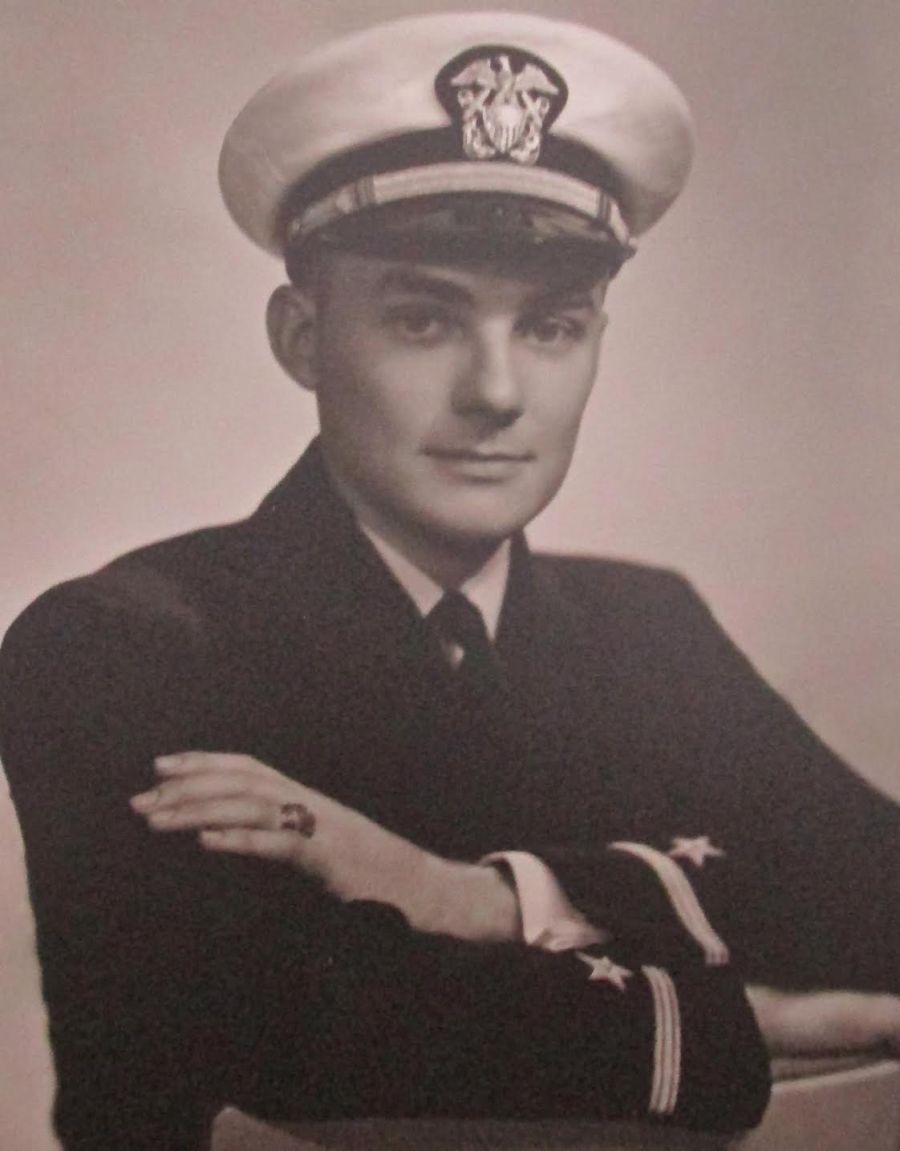Lt. John Dexter served as mine operations officers in Pacific during WW II

John Dexter of Jacaranda Trace apartments in Venice, Fla. was an expert on underwater mines during the Second World War. He was a lieutenant in Mine Warfare Operations. Photo provided
John Dexter of Jacaranda Trace apartments in Venice, Fla. was already an electrical engineer working for Dow Chemical Co. when World War II broke out in 1941 for the United Sates.
“One day I had a surge of patriotism and went down to see the recruiter in Detroit,” the 95-year-old former Navy man recalled. “I ended up as an operations officer in mine warfare.
“Magnetic mines perfected by the Germans were very effective. They were laid by submarines, PT-boats or airplanes at the entrance to enemy harbors,” Dexter said. “When ships sailed over them their magnetic field would set them off.
“I got put in Mine Warfare and sent to mine sweeping school in Norfolk, Va. to begin with. I spent six weeks there learning how to sweep mines with a group of officers before being sent off to submarine, PT-boat and attack bomber school to learn more about how mines were put down.
“Eventually I was assigned to the Naval Warfare Laboratory in Washington, D.C. I became a mine warfare operations officer. Part of my job was to show young recruits how to lay mines and the other part of my job was the development of new underwater mines. It was all top secret work.”
During the early part of WW II the Germans almost put the English out of the war by mining the entrances to British harbors.
“At one point early on England had almost run out of aviation gasoline because her harbors were mined,” Dexter explained.
Gen. Hermann Göring commander of the Luftwaffe, suggested to Hitler Germany’s harbor mining effort should be discontinued. He said the Führer should call in the air force to bomb some of the English cities and force them to capitulate. Hitler followed Goering’s bad advice and saved England from the jaws of German victory.
“If the Germans had kept up mining England’s harbors she probably would have collapsed, but they didn’t. It’s one of Hitler’s biggest mistakes,” he said.
As for Dexter he continued to work out of the Naval Ordinance Laboratory in Washington throughout the Second World War. ”
“The mines we worked on looked like a torpedo. These mines could be fired from the torpedo tubes of subs or PT-boats or dropped by parachute into the sea.
“The whole idea of mine warfare was to deny the enemy the use of their harbors,” Dexter said.
Although the Germans were successful in mining many Allied ports in Europe, they never tried to block the entrance to ports in the U.S.
Dexter and his fellow mine officers were sent to the Pacific Theatre to ply their trade.
“We mined the Mekong Delta in Vietnam during WW II, the entrance to Singapore Harbor after the Japanese took it from the British and the harbor at Rabaul, a major Japanese airbase complex on New Guinea in the South Pacific,” he said.
“Right after the war I was sent to Asia. My job was out there for six weeks to find out how effective Japanese mines were. I started in Japan where I had all the access to Japanese operational data.
“Then I went to China. Christmas 1945 I was in Shanghai. By New Year’s I was in Hong Kong and from there to Saigon, Vietnam and on to Bangkok, Thailand and home to the U.S.”
“I was discharged from the Navy in 1946 a lieutenant. I went back to Dow Chemical and worked for a total of 42 years.”
Dexter and his wife, Kate, came to Florida three years ago. They have five children: John, Bob, Carolyn, Stephen and Neil.
Dexter’s File
 Name: John F. Dexter
Name: John F. Dexter
D.O.B: 9 April 1919
Hometown: Kansas City, Mo.
Currently: Venice, Fla.
Entered Service: 28 April 1943
Discharged: 19 June 1946
Rank: Lieutenant
Unit: Naval Warfare Laboratory
This story was first published in the Charlotte Sun newspaper, Port Charlotte, Fla. on Monday, Dec. 22, 2014 and is republished with permission.
Click here to view the collection in the Library of Congress.
Click here to view the War Tales fan page on FaceBook.
Click here to search Veterans Records and to obtain information on retrieving lost commendations.
All rights reserved. This copyrighted material may not be republished without permission. Links are encouraged.
Thank you for everything, Mr. Dexter and you, Don, for reporting the story. Merry Christmas to you and yours.